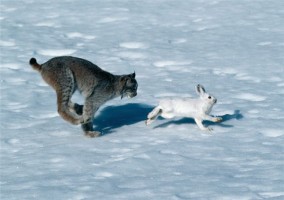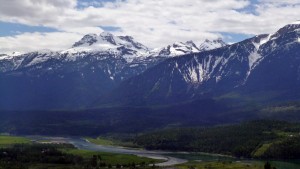Predator-Prey Dynamics: From Theory to Management conference
- Start Date: April 05, 2016
- End Date: April 07, 2016
- Time: 8:00 am
- City: Revelstoke, BC
- Venue: Revelstoke Mountain Resort
- Link to PeerJ for the conference collection page below.
Click HERE to view the conference collections page in the online journal Peer J and to submit abstracts or articles.
Click HERE for conference agenda with links to abstracts.
Conference Description
Predation is one of the most fundamental interactions in ecology because it is a primary mechanism of energy transfer among trophic levels. The effects of predation on prey populations are continually debated in the literature, even within a specific study system. Is predation compensatory (i.e. animals would have died anyway, were they not eaten), is it limiting (does it reduce the number of prey), or even regulating (is it dependent on the density of prey)? And how do we integrate new ideas, such as non-lethal effects of predation, with the more classical view of predation? This Columbia Mountains Institute conference addressed these questions and others. It was an excellent opportunity for scientists, managers, students, hunters, and guide-outfitters to learn about some of the current thinking on predator-prey interactions for mammals and birds. The conference included:
- Speakers and a poster session which addressed terrestrial predator-prey systems. (April 5-7, 2016)
- An optional computer workshop, where participants learned how to build and run basic predator-prey models (e.g., using Excel or R). Real world examples from the Kootenays and elsewhere in North America were presented.
- An optional field trip to view the Revelstoke Caribou Rearing in the Wild maternal penning site.
- A HALF-DAY REGISTRATION OPTION: April 7th presentations were on applied wildlife management, geared towards managers, guide-outfitters, hunters and the general public.
Keynote Speaker
We were pleased to welcome Dr. Liana Zanette from the University of Western Ontario as our evening Keynote Speaker. Liana’s research focuses on the many dimensions of predator-induced fear, from population- and ecosystem-level consequences, to impacts on health and development. A “paradigm shift in ecology” is occurring concerning the preeminent role of predators in affecting everything from ecosystem dynamics to global biodiversity. Dr. Zanette presented: “Fear of Predators as an Ecosystem Service”
THIS EVENT WAS OPEN TO THE PUBLIC AT 7:30 PM, WEDNESDAY APRIL 6TH
Revelation Lodge (Mid-Mountain), Revelstoke Mountain Resort. Gondola ran from 7:00 pm-9:00 pm for attendees.
Conference Themes
Conference presentations and posters addressed the following themes in terrestrial ecosystems:
- Compensatory mortality (session to be led by Dr. Mark Boyce, University of Alberta)
- Risk sensitive foraging/Non-lethal effects of predation
- Multi-prey/Multi-predator systems (session to be led by Professor Norman Owen-Smith, University of the Witwatersrand, Johannesburg, South Africa)
- Experimental manipulation of predator-prey systems. Where are we on adaptive management?
- Climate driven changes in predator-prey systems
- Endangered species management in predator-prey systems affected by multi-use landscapes (e.g. Oil and Gas Development, Forestry, Human Activity)
Presenters were asked to refer their presentation back to the question: “How does this affect management of terrestrial predator-prey systems?”
Event Partners and Sponsors
Columbia Mountains Institute was pleased to work with Revelstoke Mountain Resort in hosting this event.
The event took place at the mid-mountain lodge of Revelstoke Mountain Resort with spectacular views of the Columbia River and the Monashee Mountains. The entire lodge was reserved for this event and skiing was great, even in April!
To download a list of publications from Revelstoke researchers or research based in Revelstoke click HERE
Thank you to all our sponsors!
BCWF, CBT, Nexen, ABMI, and Monashee Guide Outfitting, Score Fencing, BC OGRIS, Vectronic Aerospace
Questions? Please contact:
Columbia Mountains Institute of Applied Ecology
Phone: 250-837-9311 Fax: 250-837-9311
Email: office@cmiae.org Web site: www.cmiae.org











